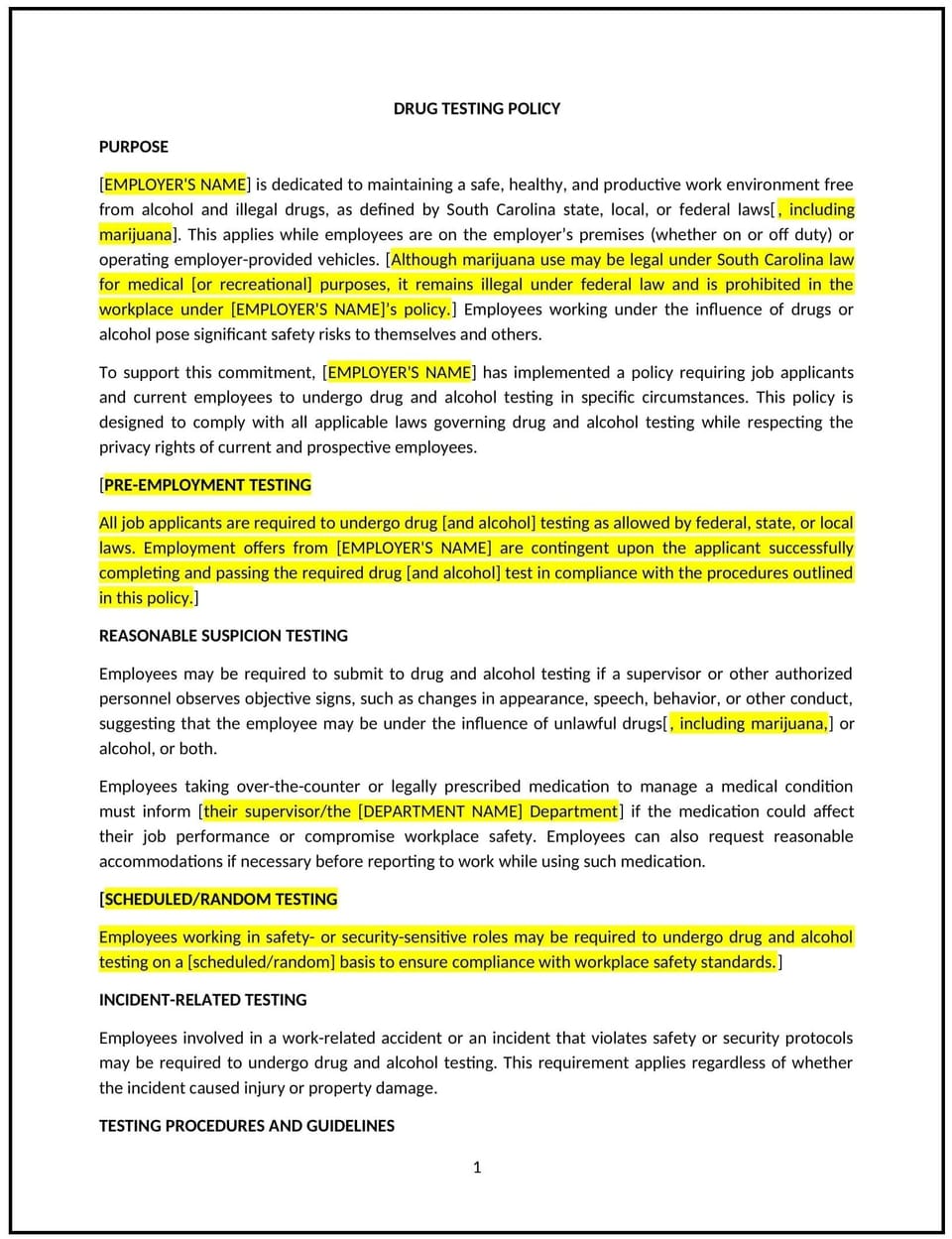Drug testing policy (South Carolina): Free template

Drug testing policy (South Carolina)
This drug testing policy is designed to help South Carolina businesses establish guidelines for drug testing employees to maintain a safe and productive work environment. It outlines procedures for pre-employment, random, and post-accident drug testing, as well as consequences for policy violations.
By adopting this policy, businesses can reduce workplace risks, promote safety, and align with general best practices for employee health and well-being.
How to use this drug testing policy (South Carolina)
- Define testing types: Specify the types of drug testing, such as pre-employment, random, or post-accident testing.
- Establish procedures: Outline the steps for conducting drug tests, including notification, sample collection, and result reporting.
- Address confidentiality: Ensure test results are handled confidentially and shared only with authorized personnel.
- Set consequences: Describe the consequences for policy violations, such as disciplinary action or termination.
- Train managers: Educate supervisors on handling drug testing procedures and maintaining confidentiality.
- Review and update: Assess the policy annually to ensure it aligns with evolving business needs and legal standards.
Benefits of using this drug testing policy (South Carolina)
This policy offers several advantages for South Carolina businesses:
- Promotes safety: Reduces workplace accidents and injuries by identifying employees under the influence of drugs.
- Enhances productivity: Ensures employees are fit for duty and able to perform their job responsibilities effectively.
- Aligns with best practices: Provides a structured approach to managing workplace drug testing.
- Builds trust: Demonstrates a commitment to maintaining a safe and healthy work environment.
- Reduces legal risks: Helps businesses comply with state and federal regulations related to drug testing.
Tips for using this drug testing policy (South Carolina)
- Communicate the policy: Share the policy with employees and include it in the employee handbook.
- Provide training: Educate managers on handling drug testing procedures and maintaining confidentiality.
- Monitor adherence: Regularly review drug testing practices to ensure compliance with the policy.
- Address issues promptly: Take corrective action if policy violations occur.
- Update regularly: Assess the policy annually to ensure it aligns with evolving business needs and legal standards.
Q: How does this policy benefit businesses?
A: This policy promotes safety, enhances productivity, and aligns with best practices by establishing clear guidelines for workplace drug testing.
Q: What types of drug testing are typically included in this policy?
A: Testing may include pre-employment, random, post-accident, or reasonable suspicion testing.
Q: How are drug test results handled?
A: Test results are handled confidentially and shared only with authorized personnel.
Q: What are the consequences for violating this policy?
A: Consequences may include disciplinary action, suspension, or termination, depending on the severity of the violation.
Q: How often should businesses review this policy?
A: Businesses should review the policy annually or as needed to ensure it aligns with evolving business needs and legal standards.
This article contains general legal information and does not contain legal advice. Cobrief is not a law firm or a substitute for an attorney or law firm. The law is complex and changes often. For legal advice, please ask a lawyer.


